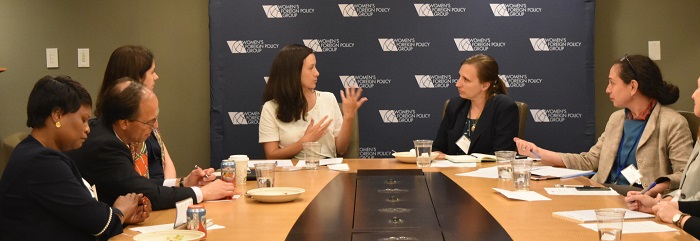|
BEYOND THE HEADLINES

Central African Republic:
Prospects of Building Sustainable Peace and the Challenging Road Ahead May 21, 2019 | Washington, DC
Alexandra Lamarche, Refugees International Advocate
Susan Stigant, USIP Director of Africa Programs
Moderator: Yesim Oruc, Deputy Director of UNDP's Washington Representation Office
Photos | Refugee International's Report
Washington, DC—On May 21, 2019, the WFPG hosted a conversation on Central African Republic: Prospects of Building Sustainable Peace and the Challenging Road Ahead with Alexandra Lamarche of Refugees International and Susan Stigant of the United States Institute of Peace. The discussion covered the unique aspects of the recent Khartoum Peace Agreement and current DDR programs, as well as the ongoing humanitarian crisis and prospects for return of the 655,000 IDPs in CAR, stressing that peace in CAR is crucial for regional stability. The speakers also addressed the role of the United Nations and the African Union, as well as growing Russian involvement and influence in the country. The program was moderated by Yesim Oruc of UNDP and was hosted by United Technologies.
Stigant offered her analysis of the Political Accord for Peace and Reconciliation, or the Khartoum Peace Agreement, which was signed by the government of CAR, as well as 14 of the armed groups in February. Although eight such peace agreements have been reached since fighting erupted in 2013, Stigant pointed out that the most recent agreement has been relatively successful in bringing armed groups into the negotiations while garnering the support of regional governments. Additionally, the agreement established binational commissions to examine border issues, hybrid brigades to address farmer-herder relations, and special committees on truth telling and reparations. However, Stigant voiced concern surrounding the closed nature of the negotiations, which largely excluded women or victim groups, as well as the large Russian presence operating outside the confines of the official delegation.
Lamarche outlined the dire nature of the ongoing humanitarian crisis in CAR. 2 million out of 4.6 million Central Africans are in need of humanitarian assistance and 655,000 displaced persons are particularly vulnerable. Lamarche identified flawed assessments and a lack of access to many rural communities as important factors contributing to a difficult humanitarian situation. The conflicts are extremely localized, and while religion is not the primary factor in the majority of the conflicts, it has triggered religious discrimination and violence. Although security has returned in the capital and the government is eager to close camps and resettle the IDPs, this is not possible until the violence subsides across the country.
Both discussed the important role of the international community, despite a lack of media attention globally. In terms of international aid, Stigant stressed the continued need for a country with political clout to champion CAR’s cause, and Lamarche called for increased international relief on the ground. MINUSCA, the UN peacekeeping force in CAR, has minimal funds to fulfill their significant responsibilities, making it difficult to provide all of the support the population needs. To date, the US has focused elsewhere and although France has supported past peacekeeping efforts, Stigant noted that the CAR government is largely distrustful of their aid, due to its colonial history. Following France’s disengagement from CAR, Russia became increasingly involved through political and military support. Notably, the CAR’s national security advisor, Valery Zakharov, is a Russian citizen, and the government has agreed to provide weapons to CAR’s army.
Lamarche also elaborated on the prospects of disarmament in the country during a discussion with the audience, noting that the International Organization for Migration’s DDR programs have been relatively successful in addressing the first wave of combatants. However, not all of the programs that are being implemented in CAR are successful because funding is largely focused on combatants with automatic weapons, whereas many the combatants only have access to less sophisticated weapons. Many DDR programs on the ground are run by NGOs with little experience in DDR. Despite these challenges, Lamarche remains positive about the prospect of improving these programs through training.
Despite all of the challenges facing CAR, both speakers expressed hope that peace is possible, should international powers step back and allow CAR to take a step forward, especially given the scale of the conflict. Pointing to a successful transition under President Samba-Panza and the democratic election of President Touadéra, they also encouraged audience members to be cautiously optimistic about the upcoming elections and the reestablishment of the rule of law.
|

